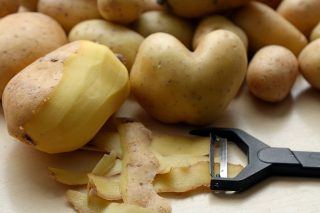South Africa. Health experts have raised the red flag on the deadly connection between COVID-19 and heart disease. They’ve warned that a balanced, healthy diet is more important than ever for safeguarding your health. In this opinion editorial, I, Claire Julsing Strydom, dietitian, weigh in on the role of potatoes in your daily diet.
In a recent Harvard Health article, cardiologist Dr. Dara K Lee Lewis noted that in comparison with the general population, individuals suffering from cardiovascular disease (CVD) “were more than twice as likely to contract severe forms of COVID-19.”
Lockdowns and working from home have also had a negative impact on household lifestyles. A number of surveys have revealed that many South Africans have reported a decline in their physical activity levels and a significant rise in weight gain over the past year – factors that further raises the risk of heart disease and strokes.
This is particularly concerning given that according to the Heart and Stroke Foundation South Africa, some 225 South Africans already die of heart disease every day.
Potatoes for Heart Awareness Month
Unfortunately, there are still many myths and misconceptions about potatoes, whereas potatoes are packed with fibre and nutrients that can actively help to lower your risk of heart disease.
Given the effects of the pandemic on our health and well-being, it’s particularly important to understand the numerous rewards of potatoes for your body, and how you can cook them correctly for the most benefit.
Packed with potassium

Photo by Peter Schad on Unsplash
Potatoes pack a punch of potassium. In fact, potatoes offer more potassium than any other vegetable – and even more than bananas.
Notably, potassium is a crucial ally in the struggle against high blood pressure – a major risk factor for heart disease and strokes. For example, sobering Heart and Stroke Foundation South Africa statistics reveal that high blood pressure causes 13% of all deaths globally, while in South Africa, it is responsible for as many as one in every two strokes and two in every five heart attacks.
Potassium works to relax blood vessels, improving blood circulation and thus helping to lower blood pressure and support good muscle health – including your heart muscle. Potassium also plays a key role in sending electrical impulses to your heart, helping to maintain a normal heart rhythm.
Filled with fibre and nutrients
As if their high potassium levels weren’t enough, potatoes are also naturally cholesterol-free, have zero-saturated fats and are low in sodium – three more heart-healthy points which work strongly in their favour.
Additionally, potatoes’ high fibre content can actively help to lower your cholesterol – another significant risk factor for heart disease. This fibre works by binding with the cholesterol (a waxy type of fat that lives in your blood) and safely drawing it into your body’s waste instead.

Chinnapong/Shutterstock
To top this all off, potatoes are also a source of vitamin C, vitamin B6 and a range of phytonutrients, which studies have shown all help to support heart health and prevent heart disease.
Get the most out of your potatoes
Given potatoes’ amazing versatility, these powerhouse vegetables can be consumed in an infinite number of ways and as part of any meal. As with anything else, however, moderation is key, and potatoes should be eaten in moderate portions as part of a balanced diet.
To maximise the health benefits of your potatoes, carefully consider your cooking method. Rather than frying, opt for a heart-healthy choice such as boiling, baking, air frying, or lightly brushing the potato with oil and roasting it. Also carefully consider any toppings: avoid adding unhealthy salt, butter or cheese, and instead look for tasty alternatives such as garlic and fresh herbs, or a dollop of pesto or sun-dried tomatoes.
And finally, don’t forget about the skin. A potato’s skin contains a huge amount of fibre and potassium – which is exactly why the Heart and Stroke Foundation has endorsed boiled, skin-on potatoes as a heart-healthy food.
“I would encourage anyone with an interest in health and nutrition, or that is suffering from issues with blood pressure or cholesterol, to educate yourself on the potential benefits of potatoes and get some cooking inspiration by looking up #WeHeartAmazambane on social media, or by visiting the Potato Nation social media pages.”
A dose of potatoes for your troubles

Potato skins stuffed with sweet corn yoghurt and coriander
With all of that said, please enjoy this delicious and healthy potato-based recipe, courtesy of Potatoes South Africa.
Potatoes stuffed with sweet corn, yoghurt, and coriander
Prepping time: 10 minutes
Cooking time: 40 minutes
Number of servings: 4
Ingredients
Stuffed potatoes:
- 2 large potatoes
- 30ml (2 tbsp) canola oil
- 125ml (½ cup) low fat cottage cheese
- 60ml (¼ cup) fresh coriander, finely chopped
Potato filling:
- 1 x 420g tin cream style sweetcorn
- 45ml (3 tbsp) plain yoghurt
- Juice of zest of 1 lime, finely chopped
- 5ml (1 tsp) cayenne pepper
- Salt and pepper, to taste
Method of Preparation:
- Preheat the oven to 180°C
- Microwave the potatoes for 6 – 8 minutes, then slice diagonally. Carefully scoop out the flesh and freeze to use as mash at a later stage
- Place the potatoes on a roasting tray and drizzle with a little oil and season to taste.
- Roast until the skin is crispy and golden, for 20 minutes
- Mix the sweetcorn with the remaining ingredients and spoon into the potato. Put back onto the roasting tray and roast for approximately 5 minutes
- Remove from the oven and serve topped with cottage cheese and a sprinkle of coriander. Serve with a mixed fresh green salad





![women [longevity live]](https://longevitylive.com/wp-content/uploads/2020/01/photo-of-women-walking-down-the-street-1116984-100x100.jpg)









